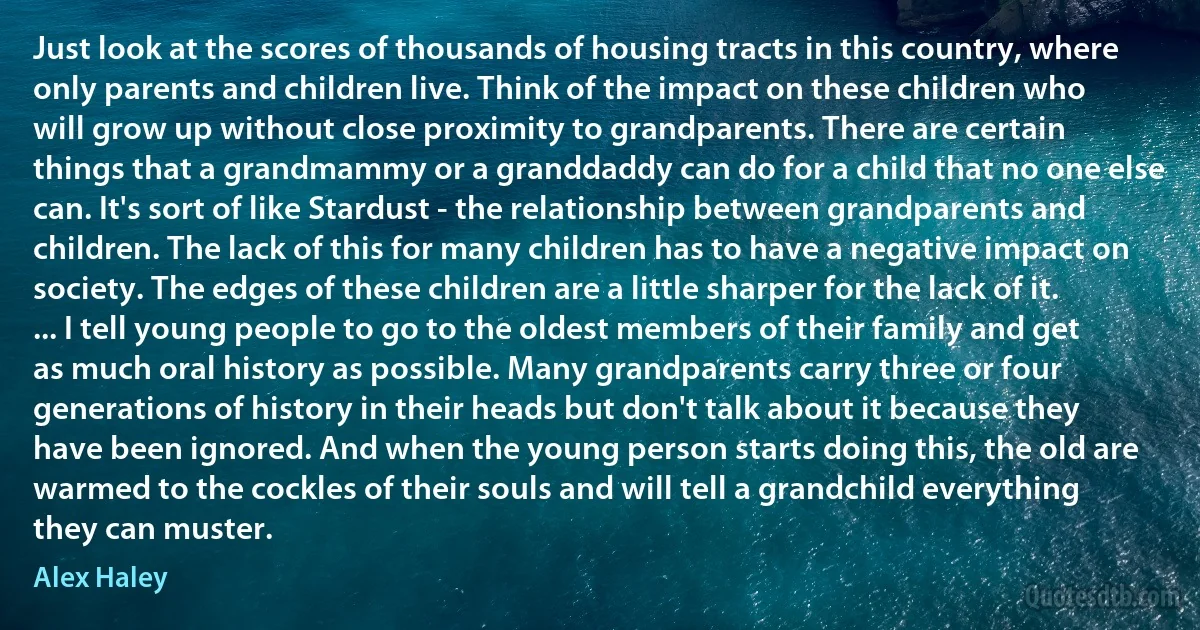
Just look at the scores of thousands of housing tracts in this country, where only parents and children live. Think of the impact on these children who will grow up without close proximity to grandparents. There are certain things that a grandmammy or a granddaddy can do for a child that no one else can. It's sort of like Stardust - the relationship between grandparents and children. The lack of this for many children has to have a negative impact on society. The edges of these children are a little sharper for the lack of it. ... I tell young people to go to the oldest members of their family and get as much oral history as possible. Many grandparents carry three or four generations of history in their heads but don't talk about it because they have been ignored. And when the young person starts doing this, the old are warmed to the cockles of their souls and will tell a grandchild everything they can muster.
Alex HaleyRelated topics
carry certain children child close country everything family four history housing lack live muster oral people person possible proximity sharper sort talk tell think three young things heads stardustRelated quotes
They are confronted in Ireland with a situation which is largely due to their own lack of insight and of sympathy, confronted with a situation which needed strong and firm handling, strong and firm, but at the same time and above all, just, even-handed, and dispassionate. They have let loose this orgy of reprisals which confuse the innocent and the guilty in a common tumult of lawless violence. They deny, they prevaricate, they cloak and screen and block the avenues to truth in a childish belief that when order has been restored, a cowed and subjugated people will spread out grateful hands to grasp the boon of pinchbeck Home Rule. I say deliberately that never in the lifetime of the oldest among us has Great Britain sunk so low in the moral scale of nations. That, at any rate, when most of the members of the Coalition are forgotten, will be an achievement which will be remembered in history.

H. H. Asquith
We must call attention, among the workers parties or the extremist tendencies within those parties, to the need to undertake an effective ideological action in order to combat the emotional influence of advanced capitalist methods of propaganda. On every occasion, by every hyper-political means, we must publicize desirable alternatives to the spectacle of the capitalist way of life, so as to destroy the bourgeois idea of happiness. At the same time, taking into account the existence, within the various ruling classes, of elements that have always tended (out of boredom and thirst for novelty) toward things that lead to the disappearance of their societies, we should incite the persons who control some of the vast resources that we lack to provide us with the means to carry out our experiments, out of the same motives of potential profit as they do with scientific research.

Guy Debord
The cultural invasion is like a leafy tree which prevents us from seeing our own sun, sky and stars. Therefore in order to be able to see the sky above our heads, our task is to cut this tree off at the roots. US imperialism understands very well the magic of communication through music and persists in filling our young people with all sorts of commercial tripe. With professional expertise they have taken certain measures: first, the commercialization of the so-called ‘protest music'; second, the creation of ‘idols' of protest music who obey the same rules and suffer from the same constraints as the other idols of the consumer music industry – they last a little while and then disappear. Meanwhile they are useful in neutralizing the innate spirit of rebellion of young people. The term ‘protest song' is no longer valid because it is ambiguous and has been misused. I prefer the term ‘revolutionary song'.

Víctor Jara
We imagine that the Creator at the actual time of creation made only one single species for each natural order of plants, this species being different in habit and fructification from all the rest. That he made these mutually fertile, whence out of their progeny, fructification having been somewhat changed, Genera of natural classes have arisen as many in number as the different parents, and since this is not carried further, we regard this also as having been done by His Omnipotent hand directly in the beginning; thus all Genera were primeval and constituted a single Species. That as many Genera having arisen as there were individuals in the beginning, these plants in course of time became fertilised by others of different sort and thus arose Species until so many were produced as now exist... these Species were sometimes fertilised out of congeners, that is other Species of the same Genus, whence have arisen Varieties.

Carl Linnaeus
The Machine Age's commitment to cause and effect was the source of many dilemmas, including the one involving free will. At the turn of the century the American philosopher E. A. Singer, Jr., showed that science had, in effect, been cheating. It was using two different relationships but calling both cause and effect. He pointed out, for example, that acorns do not cause oaks because they are not sufficient, even though they are necessary, for oaks. An acorn thrown into the ocean, or planted in the desert or an Arctic ice cap does not yield an oak. To call the relationship between an acorn and an oak ‘probabilistic' or ‘non deterministic causality,' as many scientists did, was cheating because it is not possible to have a probability other than 1.0 associated with a cause; a cause completely determines its effect. Therefore, Singer chose to call this relationship ‘producer-product' and to differentiate it from cause-effect.

Russell L. Ackoff
